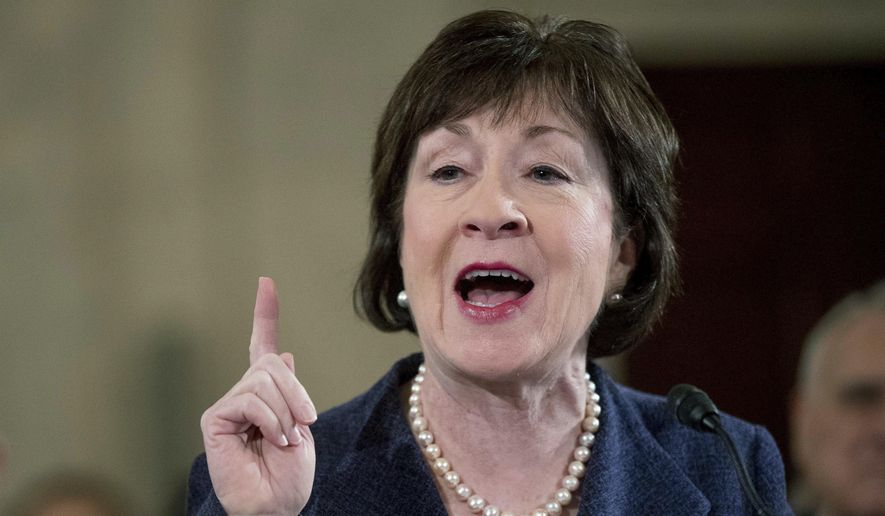Sen. Susan M. Collins signaled this week that she could jump into Maine’s governor’s race next year, which would give the Republican a good shot at holding the state’s top office — though it would give Democrats a chance to eventually win her seat in the Senate.
The centrist Ms. Collins, who was first elected to the Senate in 1996, remains a popular figure and is perhaps the state’s most dominant politician at this point.
She said she will make a final decision this fall, but if the 64-year-old chooses to run, and particularly if she wins the governor’s mansion, it could send a number of political dominoes toppling in response.
Political analysts are closely watching the landscape as potential candidates start to declare their intentions for hot-button midterm elections next year. Republicans will be trying to hold on to House and Senate majorities in an election cycle usually difficult for the party in the White House, and Ms. Collins’ statement was a prime example of how one decision can set off a chain reaction elsewhere, forcing both parties to recalibrate their options.
Republicans hold a slim 52-48 majority in the Senate. But far more Democratic incumbents are facing voters next year, leading some Republican strategists to see a good chance to expand their edge despite the historical pattern.
Under Maine law, the governor is responsible for tapping interim replacements to fill the remainder of a senator’s term, which in Ms. Collins’ case runs through 2020.
Ms. Collins made a bid for governor in 1994 and lost to Angus King, an independent who now holds Maine’s other Senate seat.
On Capitol Hill, Ms. Collins has carved out a role as one of only a few centrists, regularly breaking with fellow Republicans on social issues and seeking to forge deals with Democrats.
In Maine, her record has proved a political winner, earning four terms in the Senate and weathering some rough anti-Republican headwinds in a state and a region that has been tough ground for the party.
“Whether she runs for governor or retires, Republicans will be hard-pressed to find someone who can replicate her electoral success in the state,” said Nathan L. Gonzales, editor and publisher of Insider Elections, a nonpartisan campaign tracker. “Even in some turbulent elections, Collins has won re-election against credible foes.”
Ms. Collins’ moderate stances in Washington have spawned attacks from the hard right, which fumed over her opposition to Donald Trump’s presidential bid, and the liberal left, which ripped her vote in favor of confirming Neil Gorsuch to the Supreme Court.
For now, she says she is doing some soul-searching about whether giving up her seniority on Capitol Hill outweighs the chance as governor to “work directly on issues that are important to Maine, including jobs, economic development and education.”
“The question for me is where can I do the most good for the people of Maine,” she said in a statement to The Washington Times. “The frenetic pace and turbulent political environment in Washington have prevented me from spending any significant time thinking through the pros and the cons.”
Governor-senator switch
The Portland Press Herald reported that Gov. Paul LePage, a tea party-aligned Republican who has become a divisive figure in Maine politics and who cannot seek re-election because of term limits, would be in charge of picking a temporary successor. That opens the door for Mr. LePage to appoint himself to the seat — something that Maine historian Earle G. Shettleworth Jr. said would be a first in state history.
“It doesn’t appear as though any Maine governor has exercised that authority to appoint himself to the Senate,” Mr. Shettleworth said.
Mr. LePage’s team was mum this week on the possibilities, but if Ms. Collins wins and Mr. LePage appoints himself, he would effectively be switching places with her.
Gov. Joseph E. Brennan had the opportunity to appoint himself in 1980 when Sen. Ed Muskie stepped down to become secretary of state under President Carter, but the Democrat instead tapped George Mitchell and later described the decision, according to Mr. Shettleworth, as the best he ever made while in public office.
Other political observers said Ms. Collins, not Mr. LePage, would end up selecting her replacement because she would have no obligation to resign until just before taking the oath of office as governor.
“She can’t hold both offices, so she would have to resign moments before her swearing-in,” said Jennifer Duffy of the Cook Political Report. “Regardless of the circumstances, she would have a lot to say about the appointment.”
Brent Littlefield, who served as a top adviser to Mr. LePage, said Ms. Collins would be a strong gubernatorial candidate.
“Clearly, Sen. Collins has won multiple elections in Maine by significant percentages, and that alone shows that she would be very formidable in any race for governor,” Mr. Littlefield said, though he added that it is still early in the process. “No one in the state of Maine was considering Paul LePage as a gubernatorial candidate or as a likely Republican nominee for governor at this point in 2009.”
The state’s two House members — Reps. Chellie Pingree, a Democrat, and Bruce Poliquin, a Republican — are among those likely to ponder bids for Ms. Collins’ seat in 2020 if she leaves the Senate.
Other possible Republican contenders for the Maine governorship next year include Senate Majority Leader Garrett Mason; former Maine Republican Party Chairman Rich Bennett; Mary Mayhew, commissioner of the Maine Department of Health and Human Services; and former state House Minority Leader Josh Tardy.
The list of likely Democratic candidates includes Maine Attorney General Janet Mills; Adam Lee, co-owner of an auto dealership; former Speaker of the House Mark Eves; and lawyer Adam Cote.
Shawn Moody, an independent who ran for governor in 2010, also is said to be pondering a run.
• Seth McLaughlin can be reached at smclaughlin@washingtontimes.com.




Please read our comment policy before commenting.